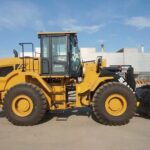Wheel loaders, or wheeled excavators, have long been an essential tool in the construction, mining, agricultural, and other industries. These versatile machines do everything, from material handling to roadwork preparation. This makes them indispensable at job sites worldwide. Over the years, technological advancements and environmental factors have transformed wheel loader design and performance. The Volvo L70H is a great example of a wheel loader that has many modern features.
Advanced Hydraulics To Precision
Hydraulics is at the core of wheel loader functionality. Modern machines rely on advanced hydraulics that provide smooth, precise, and quick operation. Smart hydraulics, whether they are lifting, loading, grading, or performing other operations, reduce cycle time.
Benefits go beyond improved efficiency. Improved hydraulic control can also reduce strain on the operator and machine. This leads to increased accuracy in material handling, less energy wastage, and more cost-effective projects.
Connectivity And Telematics
The use of data has become an important tool in the management of heavy equipment. Modern wheel loaders have telematics, which provide real-time information about fuel consumption, idle times, and load cycles.
Contractors and Fleet Managers can use the data to identify waste, plan maintenance in advance, and optimize fleet performance. This level of connectivity reduces the amount of downtime that occurs, lowers the cost of operations, and ensures that machines stay in good condition for as long as possible.
Comfort And Ergonomics For The Operator
A wheel-loader is only as effective as its operator. Modern designs focus on comfort and ergonomics for operators. With adjustable seating, climate controls, and intuitive panels, operators can work longer hours without fatigue.
Visibility is also a critical factor. Modern loaders include large windows, strategically placed cameras, and other features to reduce blind spots. These machines increase productivity by focusing on operator safety and reducing the likelihood of costly mistakes.
Fuel Efficiency And Green Performance
Wheel loaders integrate eco-friendly options as sustainability is a growing concern. Many models are built to meet strict emission requirements, with lower nitrogen oxides and particles. The fuel burns cleanly thanks to eco-modes.
The Volvo L70H wheel loader demonstrates how environmental responsibility and fuel efficiency can coexist without compromising power. Modern wheel loaders help to reduce costs over the long term by reducing emissions and fuel consumption.
Adaptive Transmission And Drivetrain
Modern wheel loaders come with adaptive gearshifts that adjust automatically based on terrain, load, and other factors. This means smoother operations, improved traction, and reduced wear and tear on critical components.
These adaptive systems can be used on any terrain, including rough construction sites or slippery surfaces. They also improve efficiency and safety. Reduced stress on drivetrains extends machine life and reduces costs.
Durability
Durability also defines modern wheel-loaders. The heavy-duty, durable components, strong frames, and axles that are part of modern wheel loaders have been designed to handle harsh work environments. Regular improvements in material science and technology ensure that machines can maintain reliability while enduring greater levels of stress.
Durability not only reduces downtime, but it also lowers the overall cost of ownership. Machines that last longer and need fewer repairs give contractors a better return on investment.
Attachments That Are Versatile
Wheel loaders do not only have buckets. Modern models come with attachments like forks or grapples. They also have sweepers and even snowplows. Quick couplers enable operators to switch attachments quickly and maximize flexibility on a job site.
This versatility enables a wheel loader to handle different roles in different projects. It reduces the requirement for additional equipment and reduces overall equipment cost.
Final Thoughts
Wheel loaders, once simple material movers, have evolved to become intelligent, efficient, versatile machines. Modernity is defined by key features, such as intelligent control management, advanced hydraulics, telematics, ergonomic cabs, fuel-efficient engines, and advanced telematics. These features, along with durability, adaptive driving trains, and the ability to attach attachments, are what make them so popular in construction and industrial operations.
The Volvo L70H wheel loader is a great example of how these improvements work together for superior performance and lasting value. Modern wheel loaders combine innovation, productivity, and reliability to create the best possible solution for heavy industries.








